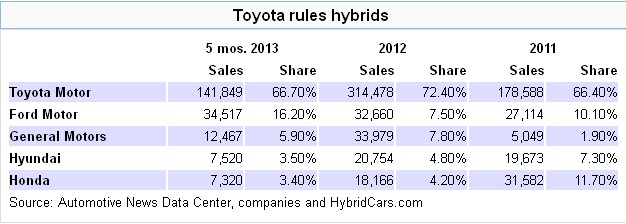Toyota still reigns, but Ford is flexing its muscles
Toyota Motor Corp. is still the 500-pound gorilla of the hybrid world, but this year a challenger has emerged.
Through May, Ford Motor Co. sold 34,517 hybrids, a number that is still dwarfed by Toyota's 141,849. But the 2013 Ford C-Max Hybrid and 2013 Fusion Hybrid have brought some stylistic flair to the segment and are aimed at customers who want to combine decent fuel economy with a dose of fun-to-drive.
"While Toyota still commands the overwhelming majority of the hybrid market, Ford has established itself as the second-largest make in the advanced-drive arena and has made a huge jump in market share from 2012 to the first five months of 2013," says Jeremy Acevedo, an analyst at Edmunds.com. "Toyota has become synonymous with the green car, but Ford has done an admirable job chipping away at that."
"We've taken a big bite out of them," says C.J. O'Donnell, Ford's marketing manager for electrified vehicles. In a little more than a year, Ford has more than doubled its share, he says.
Ford has taken aim at the Prius in a series of whimsical TV and online ads dubbed the Hybrid Games, pitting the C-Max against the Prius and Prius v. The C-Max has a 7 percent share of the hybrid market, compared with a 3.8 percent share for the Escape Hybrid in 2011, a vehicle many dealers were disappointed to see disappear in 2013.
Needless to say, Toyota is not fazed by Ford's incursion into turf it has owned since introducing the original Prius in Japan in 1997.
Says John Hanson, a spokesman for Toyota Motor Sales U.S.A.: "We've said openly that we believe hybrids were the way the industry needed to move" to meet stricter emissions and fuel economy requirements.
"We have said specifically we hope other OEMs get into the hybrid business, and we'll be hybridizing every vehicle we sell," he says. "What you're seeing is a proliferation of hybrids. The reason you're seeing our market share go down is because more OEMs have decided hybrids are smart."
Toyota still rules the hybrid roost. For the first five months this year, Toyota has a 66.7 percent share of the hybrid market, not including plug-in hybrids. That's down from 72.4 percent in 2012. Ford is a distant second with 16.2 percent, up from 7.5 percent in 2012. General Motors is way back in third with 5.9 percent, according to data from the Automotive News Data Center, automakers and HybridCars.com.
Three Prius models outsold the C-Max through May. That includes the most direct competitor, the Prius v -- 15,629 to 14,969.
The Camry Hybrid outsold the Fusion Hybrid 19,956 to 17,226. On the luxury side, the Lexus ES Hybrid has outsold the Lincoln MKZ Hybrid 6,710 to 2,322.
Despite the strides it has made, the C-Max has taken some hits for quality and fuel economy. The C-Max finished last among all nameplates in the JD Power Initial Quality Study based on number of problems reported by consumers in the first 90 days of ownership, according to USA Today.

Consumer Reports has reported the C-Max got only 37 mpg on its test regimen, far below the EPA rating of 47 mpg highway that Ford advertises.
Those issues don't seem to have hurt the C-Max, which O'Donnell says is making conquests from its formidable rival.
O'Donnell says the company's strategy of making hybrids such as the C-Max on a flexible assembly line gives Ford an advantage. Ford spends less on incentives because it doesn't have to keep a dedicated hybrid assembly line going but can instead be flexible, he says. The C-Max Hybrid is made at Ford's Michigan Assembly Plant alongside the Focus, Focus Electric and C-Max Energi, a plug-in hybrid.
Edmunds.com numbers show Toyota spent roughly double what Ford did on incentives for its hybrid fleet.
In May, Toyota spent an average of $1,811 compared to Ford's $918. The numbers include the Prius Plug-In and the C-Max Energi.
"Our ability to mix and match at Michigan Assembly gives us the ability to adjust to the market and modestly apply incentives," he says.
Toyota's Hanson points out that Ford isn't the only carmaker making hybrids on a flexible assembly line.
"At our Georgetown, Kentucky, plant on one assembly line, a worker will be making four cars: the Camry, Camry Hybrid, Avalon and Avalon Hybrid," he says.
And Toyota will soon be building the Highlander Hybrid alongside the conventional Highlander and Sequoia in Princeton, Ind. Multiple versions of the Prius are built at Toyota's massive Tsutsumi plant in Japan, which also builds the Camry, Premio, Allion and Scion tC.
Hanson downplays the argument that Ford is more cost-efficient and therefore doesn't have to spend as much on incentives.
"Even if it's double the incentive, we have four times the volume," and, he says, that's a bargain he says Toyota will take any day.
Gasgoo not only offers timely news and profound insight about China auto industry, but also help with business connection and expansion for suppliers and purchasers via multiple channels and methods. Buyer service:buyer-support@gasgoo.comSeller Service:seller-support@gasgoo.com







